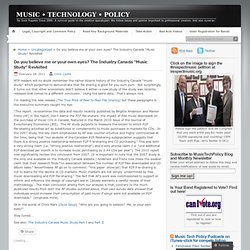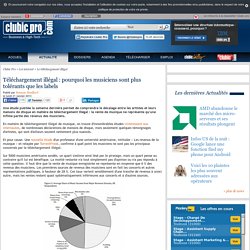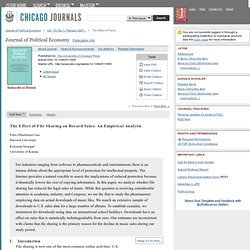

Piracy Lawsuits Dominated By Just Three Movie Companies. A new study into IP litigation over the past 20 years has revealed that file-sharing has transformed copyright litigation in the United States.

In particular, attacks against anonymous file-sharers dominated the landscape of the past decade, with just three companies now responsible for 93% of all John Doe lawsuits. Thanks to the development of advanced file-sharing systems and fast Internet connections, lawsuits aimed at alleged Internet pirates have become commonplace over the past decade and are showing no signs of disappearing anytime soon. The statistics behind the threats have been documented periodically but now a detailed study of IP litigation as a whole has painted a clearer picture of trends during the past 10 years.
Study: French three-strikes law did not deter o... Do you believe me or your own eyes? The Industry Canada “Music Study” Revisited « MUSIC. Home > Uncategorized > Do you believe me or your own eyes?

The Industry Canada “Music Study” Revisited MTP readers will no doubt remember the rather bizarre history of the Industry Canada “music study” which purported to demonstrate that file sharing is good for you yum yum. Not surprisingly, it turns out that other economists didn’t believe it either–a new study of the study was recently released that comes to a different conclusion. Using the same data. That’s always nice. Sound Recording Just 6% of Average Musician’s Income (Updated)
For the major music labels the sales of recorded music represent the majority of their revenue, but a different picture emerges when looking at the income of individual musicians.

A new survey among 5,000 U.S. musicians of different genres shows that on average only six percent of all revenue comes from recorded music. The research concludes that copyright law mostly affects the revenue of the highest-income musicians in a direct fashion. The RIAA is certain, piracy has a devastating impact on the music industry. However, a comprehensive study by Professor Peter DiCola of the Northwestern University School of Law shows that musicians themselves are divided on the subject. The survey questioned more than 5,000 United States artists on a variety of subjects, including unauthorized file-sharing.
Of all artists about a quarter say that they are hurt by online file-sharing, but just as many believe that file-sharing helps them. Average revenue streams. Téléchargement illégal : pourquoi les musiciens sont plus tolérants que les labels. Une étude publiée la semaine dernière permet de comprendre le décalage entre les artistes et leurs maisons de disque en matière de téléchargement illégal : la vente de musique ne représente qu'une infime partie des revenus des musiciens.

En matière de téléchargement illégal de musique, on trouve d'innombrables études s'intéressant aux internautes, de nombreuses déclarations de maisons de disque, mais seulement quelques témoignages d'artistes, qui sont d'ailleurs souvent nettement plus nuancés. Et pour cause. Une nouvelle étude d'un professeur d'une université américaine, intitulée « Les revenus de la musique » et relayée par TorrentFreak, confirme à quel point les musiciens ne sont pas les principaux concernés par le téléchargement illégal. Sur 5000 musiciens américains sondés, un quart s'estime ainsi lésé par le piratage, mais un quart pense au contraire qu'il lui est bénéfique.
La moitié restante n'a tout simplement pas d'opinion ou n'a pas répondu à cette question.
Journal of Political Economy, Vol. 115, No. 1 (February 2007), pp. 1-42. Felix Oberholzer‐Gee Harvard University Koleman Strumpf University of Kansas For industries ranging from software to pharmaceuticals and entertainment, there is an intense debate about the appropriate level of protection for intellectual property.

The Internet provides a natural crucible to assess the implications of reduced protection because it drastically lowers the cost of copying information. I. Jump To Section... Assessing the Academic Literature Regarding the Impact of Media Piracy on Sales by Michael Smith, Rahul Telang.
Just As Many Musicians Say File Sharing Helps Them As Those Who. Snoopers found tracking activities of illegal file sharers. Internet users that have downloaded popular movies and games hosted on torrent sites may have had their activities monitored by police officers or entertainment industries snoops, according to new research.
The claim was made by a group of computer scientists from the University of Birmingham, led by Tom Chothia. His group have been tracking BitTorrent traffic for the past two years. The team set up a monitoring client to track the top 100 most popular torrent files listed under various categories on The Pirate Bay and analyse the behaviour of users sharing those files. The team were quickly able to identify the use of so-called indirect monitoring, by analysing the behaviour of peers in the BitTorrent swarms for popular files. There are dozens of firms that offer these torrent monitoring services, and the group was quickly able to find peers within swarms that had IP addresses connected to many of these firms.
Monty Python increased saled when put online. PiracyandMoney. Study file sharing. Study LSE pircay not killed music. EFF study filesharing/artists. BSA's Latest Study on Piracy and Economic Benefits "Shockingly Misleading"